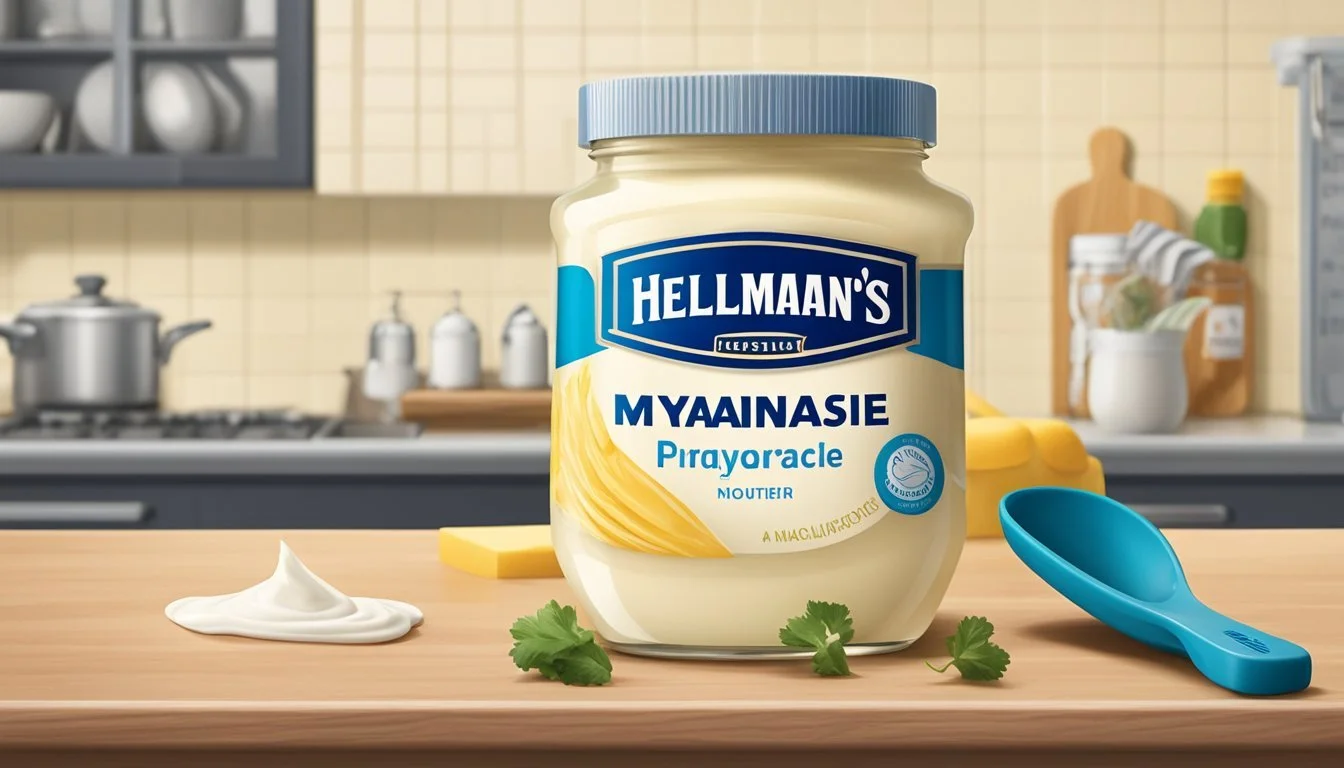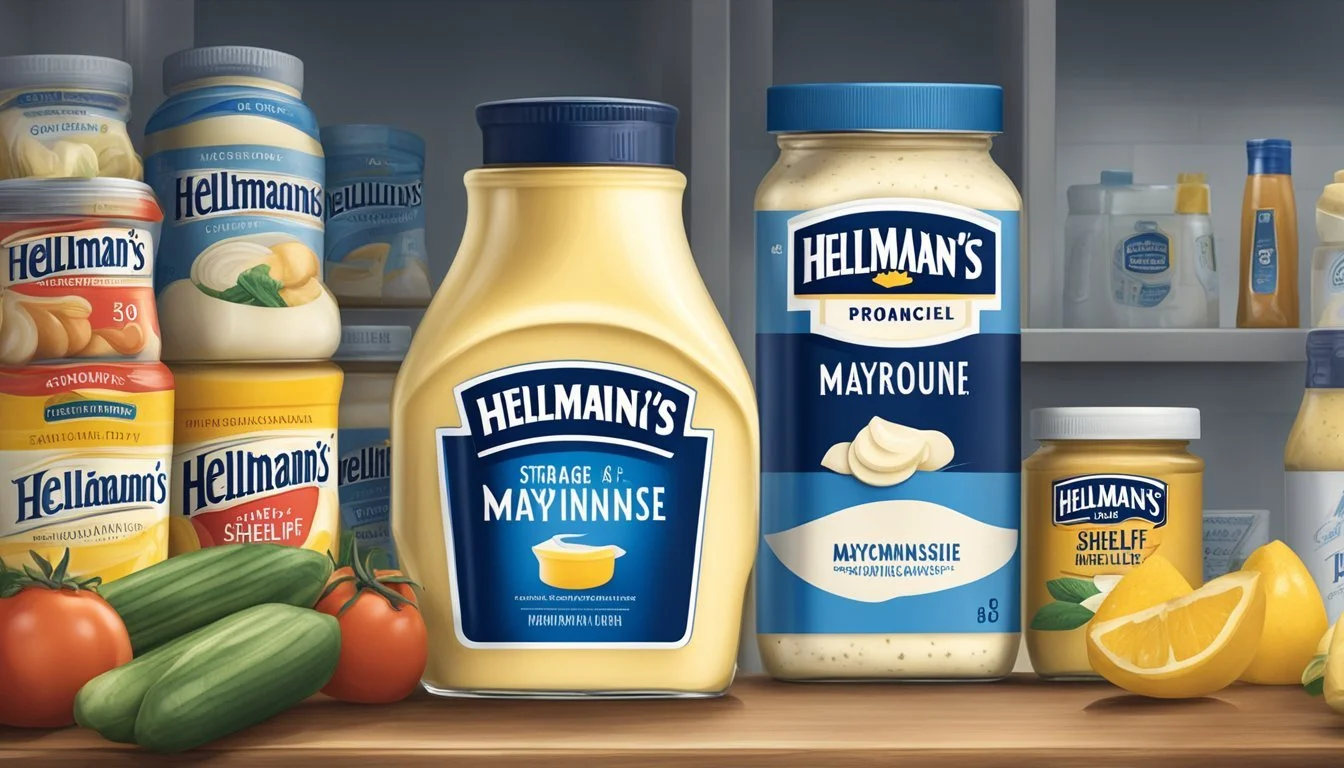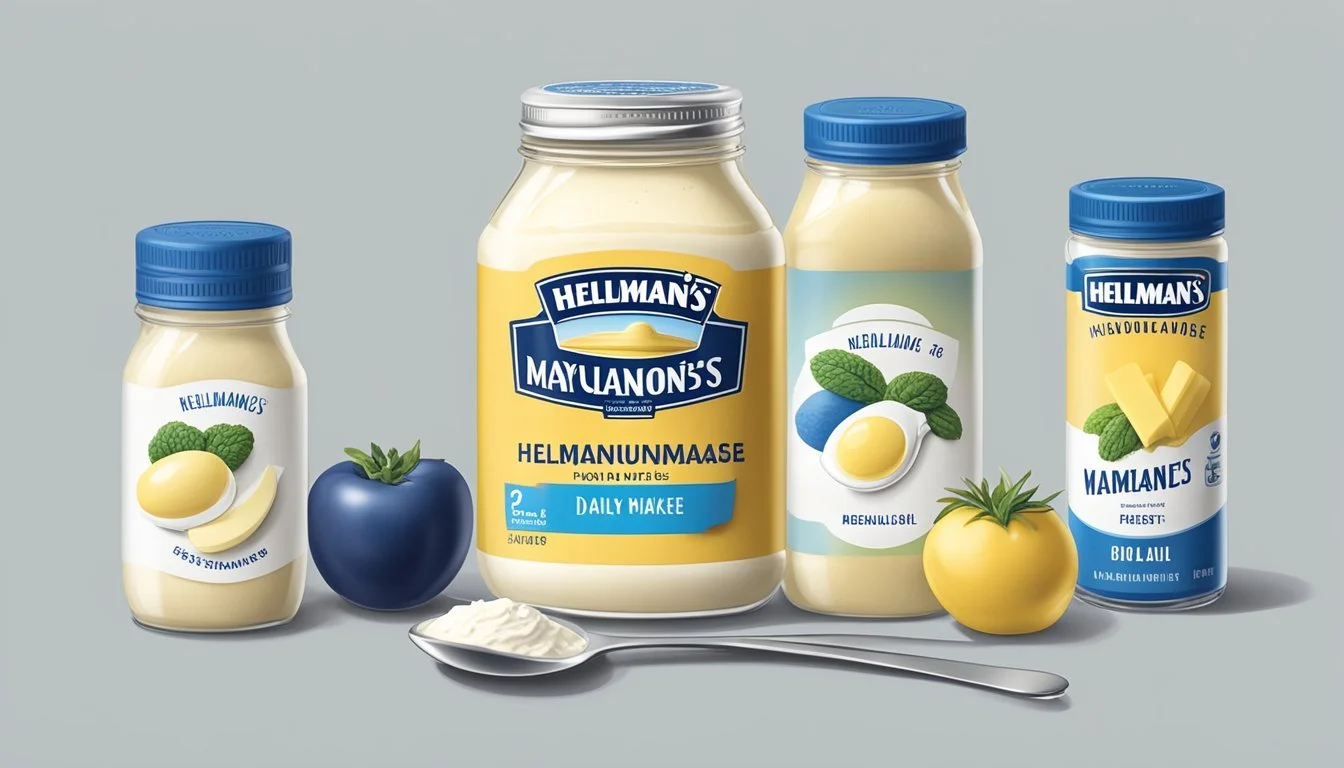How much Hellmann's mayonnaise per day is too much?
Understanding Daily Limits
Consuming mayonnaise, such as Hellmann's, can enhance the flavor and texture of a variety of dishes. The key to its enjoyment, however, lies in moderation. Hellmann's mayonnaise provides a creamy taste and is often used in sandwiches, salads, and sauces. With approximately 90 calories and 10 grams of fat per tablespoon, it is a calorie-dense food. The American Heart Association recommends limiting total fat intake to 25-35% of total daily calories, emphasizing the importance of monitoring the amount of mayonnaise consumed in order to maintain a balanced diet.
The sodium content in Hellmann's mayonnaise is another consideration. A single tablespoon contains around 90 milligrams of sodium. Although sodium is an essential nutrient, excessive consumption can lead to health problems such as hypertension and cardiovascular disease. Individuals should consider their overall daily sodium intake from all food sources since the U.S. Dietary Guidelines for Americans suggest limiting sodium to less than 2,300 milligrams per day for healthy adults. As such, understanding the nutritional content of mayonnaise can help consumers make informed choices about their consumption.
Nutritional Profile of Mayonnaise
Hellmann's mayonnaise provides a dense calorie content and is high in fats, albeit with a varied profile of saturated and unsaturated fats. It is important to understand the nutritional makeup of this condiment to make informed dietary choices.
Calories and Total Fat Content
A single tablespoon (approximately 13-15 g) of Hellmann's mayonnaise contains between 90 to 100 calories. The total fat content tends to be around 10 to 11 grams per tablespoon, accounting for nearly all of the calories in the product.
Saturated and Unsaturated Fats
Mayonnaise is a rich source of fats, predominantly unsaturated, which are considered healthier than saturated fats. Hellmann's mayonnaise contains about 1.5 grams of saturated fat per tablespoon. Unsaturated fats in mayonnaise include both polyunsaturated and monounsaturated fats, which can be beneficial for heart health when consumed in moderation.
Vitamins and Minerals in Mayo
Mayonnaise contains several vitamins and minerals, though in small amounts. It is a good source of:
Vitamin E: An antioxidant that helps protect the body from free radicals.
Vitamin K: Important for blood clotting and bone health.
As for minerals, mayonnaise provides a modest amount of:
Sodium: About 90 milligrams per tablespoon. It's crucial to keep an eye on sodium intake for overall health.
Small amounts of calcium, phosphorus, magnesium, and zinc can also be found in mayonnaise, contributing to various bodily functions, including bone health and immune system support.
While mayonnaise does contain cholesterol, it's important to note that dietary guidelines have shifted in recent times, acknowledging that the cholesterol in food has less of an effect on blood cholesterol than once thought. Nonetheless, it's still important for individuals to consider their overall dietary cholesterol intake.
Health Concerns Associated with Mayonnaise
Consuming Hellmann's mayonnaise in excess can contribute to several health concerns, particularly related to heart health and blood pressure. The ingredients and nutritional content of mayonnaise directly relate to these issues.
Cholesterol and Heart Disease
A tablespoon of Hellmann's mayonnaise contains cholesterol, an essential but potentially troublesome substance in our diet. It's important to manage cholesterol intake to prevent the build-up of fatty deposits in one's arteries, which can lead to heart disease. With high levels of saturated fat, frequent consumption of mayonnaise can potentially elevate cholesterol levels, increasing the risk of heart disease.
High Blood Pressure and Sodium Intake
Sodium is a mineral essential for maintaining electrolyte balance, but in excess, it can lead to high blood pressure. With around 90 milligrams of sodium per tablespoon, awareness of the cumulative intake from mayonnaise and other food sources is important to maintain healthy blood pressure levels.
Trans Fats and Hydrogenated Oils
While trans fats have been significantly reduced in many products, some mayonnaises, including older formulas of brands like Hellmann's, traditionally contained hydrogenated oils, which are sources of trans fat. Consumption of trans fats may increase the risk of heart disease, and they have been largely phased out of food products. Label scrutiny is advised to check for these ingredients.
Mayonnaise Consumption Guidelines
When considering how much Hellmann's mayonnaise to consume, one should be mindful of the recommended serving size, practice portion control, and be aware of alternative mayo options that might align better with specific dietary preferences or restrictions.
Recommended Serving Size
A serving of Hellmann's mayonnaise is typically 1 tablespoon, which contains about 90 milligrams of sodium and 10 grams of total fat. Even though fat is an essential part of the diet, necessary for the absorption of vitamins and hormone synthesis, consuming it within recommended limits is crucial to maintain a balanced diet.
Portion Control
It can be easy to exceed the recommended serving size, especially when not measuring. To maintain portion control, individuals should:
Use measuring spoons or cups when adding mayonnaise to foods.
Be aware that adding multiple servings can lead to excessive intake of sodium and fat.
Remember that 2 tablespoons of mayonnaise equal approximately 18% of the daily sodium intake for someone on a 1,500 mg sodium diet.
Alternative Mayo Options
For those seeking to reduce their intake of fat or adhere to specific dietary restrictions, several alternative options exist:
Low-fat mayo: A lighter version that reduces the total fat content per serving.
Plant-based and vegan-friendly mayo: These alternatives exclude animal products and often provide a similar taste and texture while catering to dietary preferences.
Homemade mayo: Allows for complete control over ingredients, enabling adjustments in fat and sodium content to suit personal health goals.
Role of Mayonnaise in Diet
Mayonnaise, a common condiment in various diets, is primarily composed of fats and contributes essential fatty acids, but its role must be considered in the context of overall dietary balance and individual nutritional needs.
Mayo as a Source of Fatty Acids
Mayonnaise is rich in fatty acids, predominantly in the form of unsaturated fats. These include omega-6 and omega-3 fatty acids, which are essential as the body cannot synthesize them. A typical serving of Hellmann's mayonnaise contains about 10 grams of total fat, of which unsaturated fats are a substantial part.
Balancing Omega-6 and Omega-3 Intake
While mayo provides beneficial fats, the ratio of omega-6 to omega-3 fatty acids is critical. High intakes of omega-6 fatty acids relative to omega-3 can contribute to inflammation and other health issues. The ideal ratio ranges from 1:1 to 4:1, so consumers should balance their mayo intake with foods high in omega-3s, such as flaxseeds and fatty fish, to maintain optimal health.
Dietary Considerations for Mayo Intake
From a nutritional standpoint, mayonnaise is low in protein, carbohydrates, sugar, and fiber, with the latter two often being at zero grams per serving. Net carbs are therefore negligible. However, with about 90 milligrams of sodium per tablespoon, individuals should monitor and moderate their mayonnaise consumption, especially when managing sodium intake for heart health or other dietary restrictions.
Understanding Food Labels and Ingredients
When choosing mayonnaise, it is crucial to look closely at the food labels and ingredient list to understand what one is consuming on a daily basis. This section is designed to navigate through the components of Hellmann's mayonnaises, from the ingredients they contain to the type of mayonnaise options available.
Decoding the Ingredient List
Hellmann's Real Mayonnaise typically lists soybean oil, water, whole eggs and egg yolks, vinegar, salt, sugar, lemon juice, and calcium disodium EDTA (to protect quality). Each ingredient plays a role in the taste, texture, and preservation of the mayonnaise. For example, eggs act as emulsifiers to blend oil and water effectively.
Identifying Additives and Preservatives
Additives and preservatives in Hellmann's mayonnaise, like calcium disodium EDTA, are included to maintain product quality. These components help extend shelf life and prevent spoilage. Consumers should be aware that while these ingredients are approved for use, they may prefer to limit their intake of artificial additives.
Real Mayonnaise vs. Alternatives
Real mayonnaise, such as Hellmann's Real Mayonnaise, is made with simple ingredients like eggs, oil, and vinegar. In contrast, mayonnaise alternatives might include modified food starches or additional artificial ingredients to alter texture or taste. Consumers often choose real mayonnaise for its authentic flavor and lack of artificial ingredients.
Mayonnaise in Culinary Practices
Mayonnaise is a versatile emulsion commonly applied in both classic and avant-garde gastronomy. Its creamy texture and neutral flavor make it an essential component in numerous recipes and its use as a condiment and ingredient is widespread.
Classic and Modern Mayo Recipes
In culinary traditions, chefs have long relied on mayonnaise to enhance the flavors and textures of dishes. It serves as the base for various dips and dressings and is a staple in sandwiches where it moistens and melds flavors between slices of bread. For instance, the traditional egg salad recipe combines boiled eggs and mayonnaise to create a rich, creamy mixture. Furthermore, mayonnaise plays a pivotal role in modern adaptations of recipes such as in the trending avocado toast, where a layer of mayonnaise can add a tangy zest to the creamy avocado.
Mayonnaise as a Condiment and Ingredient
Mayonnaise transcends its role as a mere sandwich spread. As a condiment, it's a popular choice for enhancing plain foods or as a base for more complex sauces like aioli or remoulade. In contemporary kitchens, mayonnaise is applied creatively; for example, it's used as a binder in tuna salads or as a key component in casseroles and gratins, adding moisture and richness. Not just limited to savory foods, it's also integrated into some baked goods to provide tenderness and depth.
Storage and Shelf Life of Mayonnaise
When it comes to Hellmann's mayonnaise, understanding its storage and shelf life is critical for maintaining its quality and safety. An unopened jar of Hellmann's mayonnaise is generally good for 3-4 months past the best-by date if stored properly.
Proper Refrigeration Practices
Once opened, Hellmann's mayonnaise should be kept refrigerated at all times. The optimal refrigerator temperature for storing mayonnaise is between 35°F and 40°F. This helps in slowing down the growth of bacteria and preserving the emulsion of oil and water, which is stabilized by preservatives such as vinegar or lemon juice.
Tips for Refrigeration:
Consistent Cooling: Ensure the mayonnaise is kept at a steady, cool temperature.
Tightly Sealed: Always seal the jar tightly to minimize exposure to air and contaminants.
Avoid Cross-Contamination: Use clean utensils when scooping mayonnaise to prevent the introduction of bacteria.
Signs of Spoilage
Mayonnaise contains water, oil, and preservatives, making it a target for contamination if not stored correctly. It's important to recognize the signs of spoilage, as consuming spoiled mayonnaise can lead to foodborne illness.
Common indicators include:
Change in Color: Mayonnaise that has turned a yellowish hue or has any discoloration.
Unpleasant Odor: Any off-smelling or sour aroma is a clear sign the mayonnaise may be spoiled.
Altered Taste: If in doubt, a small taste of mayonnaise that seems off can confirm spoilage. However, this should be done with caution.
Visible Mold Growth: The presence of mold on the surface or inside the jar means the mayonnaise should be discarded immediately.
Regularly checking these characteristics can help you ensure that the Hellmann's mayonnaise you consume is fresh and safe.
Common Questions and Misconceptions
In exploring the impact of Hellmann's mayonnaise on one's diet, it is vital to address frequently asked questions and distinguish nutritional myths from facts.
FAQs About Mayonnaise Consumption
How much mayonnaise is safe to consume daily? One should limit mayonnaise intake as it can be high in calories and fat. The American Heart Association recommends a maximum of 5-6% of one's daily caloric intake from saturated fat; for Hellmann’s mayonnaise, which has 1.5 grams of saturated fat per tablespoon, one should be mindful not to exceed this as part of their total intake.
Does mayonnaise consumption lead to heart disease? Mayonnaise contains saturated fats which, if consumed in excessive amounts, can contribute to higher cholesterol levels and increase the risk of heart disease. Moderation is key, along with overall dietary balance.
Can eating mayonnaise affect blood pressure? Mayonnaise has sodium, which, in large amounts, can elevate blood pressure. Each tablespoon of Hellmann’s mayonnaise contains about 90 milligrams of sodium, so monitoring overall sodium intake is crucial.
Nutritional Myths vs. Facts
Myth: Hellmann’s mayonnaise is an unhealthy additive to any diet.
Fact: Mayonnaise can fit into a balanced diet when used in moderation. Hellmann's mayonnaise, for example, is made with real ingredients and contains no artificial flavors or preservatives.Myth: Mayonnaise is loaded with cholesterol and should be avoided altogether.
Fact: While containing cholesterol, mayonnaise does not need to be completely avoided. Limits should be observed to maintain a healthy cholesterol level.
Additional Resources and Information
When seeking detailed nutritional information or aiming to join discussions about Hellmann's mayonnaise consumption, individuals have various resources available to them. Utilizing these tools can help one determine how much mayonnaise to consume daily.
Online Tools and Databases
MyFoodData is a notable online database that offers comprehensive nutrient profiles for a wide array of foods, including Hellmann's mayonnaise. Users can access information on calorie content, macronutrients, and more to make informed decisions based on their dietary needs.
Website: MyFoodData
Feature Details Nutrient Information Profiles for various foods Food Comparison Compare nutrient content Dietary Planning Tailored for individual needs
Social Media and Community Discussions
Social media platforms such as Instagram, Facebook, and Twitter provide spaces where enthusiasts and experts alike share their experiences and tips on Hellmann's mayonnaise consumption. These platforms often host community discussions and facilitate peer-to-peer support.
Hashtags to Follow:
Instagram & Twitter:
#HellmannsMayo,#HealthyEatingFacebook: Search for "Hellmann's Mayonnaise" in groups and pages.
Key Profiles for Information:
Instagram: Influencers sharing recipes and usage ideas.
Facebook: Official brand pages and diet-focused groups.
Twitter: Nutritionists and dietitians often share advice and insights.
Legal and Affiliate Information
In this section, the reader will gain an understanding of the affiliations and legal aspects concerning the promotion of products, specifically Hellmann's mayonnaise. Emphasis will be placed on the Amazon Associate Program outlined below.
Amazon Associate Program
The publisher of this article participates in the Amazon Associate Program. When readers click on affiliate links present within the article and make qualifying purchases on Amazon, the publisher earns a commission. It is important to note that this does not affect the purchase price of the products.
Qualifying Purchases:
Any Hellmann's mayonnaise product bought following an affiliate link
Other items added to the cart after clicking the affiliate link UITextView
The participation in the Amazon Associate Program is a common practice to offset costs and to maintain the resource-rich content provided to the readers. The program is designed to provide a means for sites to earn advertising fees by advertising and linking to Amazon. All reviews and recommendations related to Hellmann's mayonnaise are based on the publisher's independent analysis and assessment.












